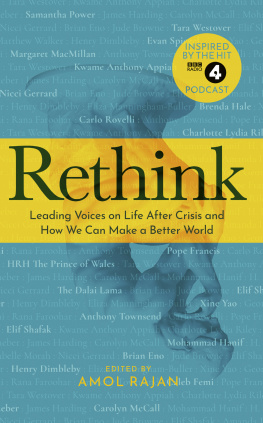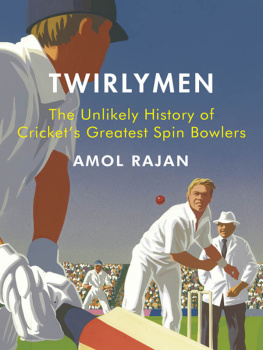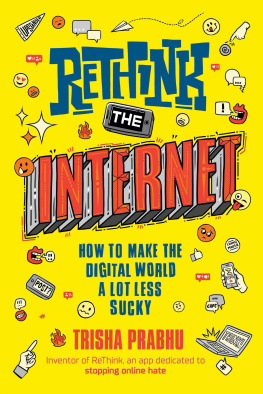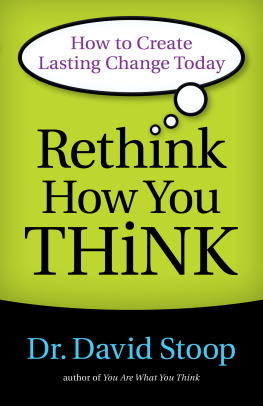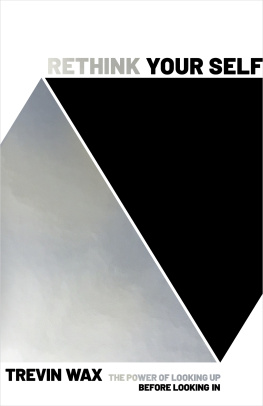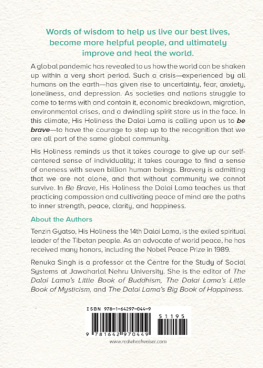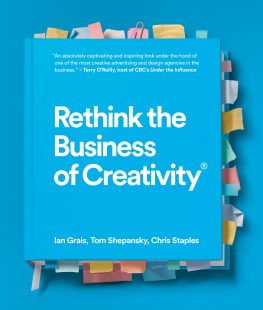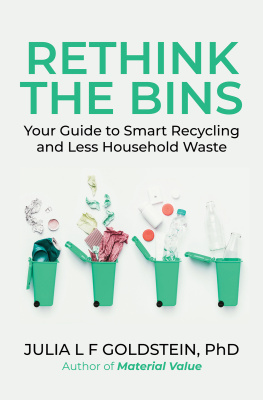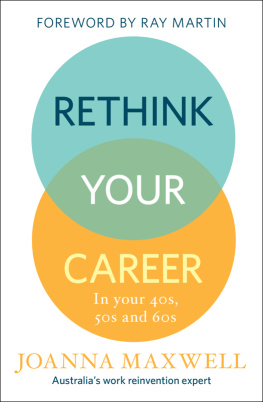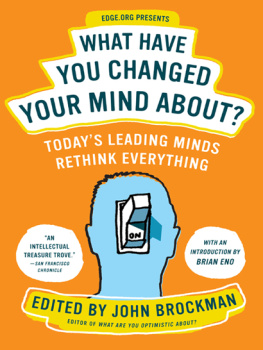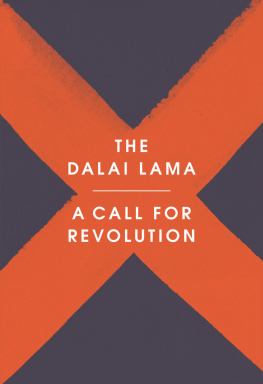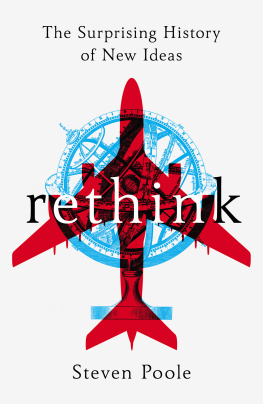Edited by Amol Rajan
RETHINK
Leading Voices on Life After Crisis and
How We Can Make a Better World

EBURY
UK | USA | Canada | Ireland | Australia
New Zealand | India | South Africa
Ebury is part of the Penguin Random House group of companies whose addresses can be found at global.penguinrandomhouse.com.

First published by BBC Books in 2021
Introductions 2021 Amol Rajan
Rethink is licensed by the BBC BBC 2021
The moral right of the author has been asserted
Cover design by Blacksheep-UK.com
Cover image reference Depositphotos
Editorial Director: Albert DePetrillo
Assistant Editor: Daniel Srensen
Project Editors: Grace Paul and Steve Tribe
Design and typesetting: seagulls.net
ISBN: 978-1-473-53289-2
This ebook is copyright material and must not be copied, reproduced, transferred, distributed, leased, licensed or publicly performed or used in any way except as specifically permitted in writing by the publishers, as allowed under the terms and conditions under which it was purchased or as strictly permitted by applicable copyright law. Any unauthorized distribution or use of this text may be a direct infringement of the authors and publishers rights and those responsible may be liable in law accordingly.
AMOL RAJAN
Introduction
Plague, revolution, war and famine are the customary means by which particular years mark the beginning and end of epochs. In modern history, 1666, 1776, 1848, 1918 and 1945 all have outsize influence on our imaginations. They mark not just the end of an era, but of some vaster chapter in the story of our species, defined by distinctive forces, ideas and events. The year 2020 always had a landmark ring to it. Now, because of Covid-19, a respiratory virus named after the year it emerged, future historians will also write about a world BC and AD: Before Coronavirus and After the Disease. What happens next, to adapt a ubiquitous quote by the economist Milton Friedman, depends not just on the power of the ideas lying around, but the ideas of those around us with most power, whether individual or institutional.
Friedmans observation obeyed an iron law of famous political quotations: namely, the much more interesting sentence that followed is largely forgotten. He went on to say, referring to the intellects of his day: That, I believe, is our basic function: to develop alternatives to existing policies; to keep them alive and available until the politically impossible becomes the politically inevitable.
This is the starting point for Rethink and an invitation to you.
For several years now, and long before most of us had heard the word coronavirus, I have argued that we are living through one of historys epoch shifts. Three giant forces ecological devastation, a technological revolution and Easternisation mean that we entered 2020 having already experienced years of dizzying, and dislocating, change. In short order, we have seen the worst financial crash since 1929, the Arab Spring and a global surge in authoritarian populism. Now, the first pandemic in a century is brutal confirmation of just how momentous this period in our lives is. It is a catalyst for many of the deep global trends already underway. And also a prompt for new habits, innovations and cultural change.
It is often said, including by some of our essayists in the pages that follow, that pandemics dont create new trends so much as accelerate underlying ones. In fact, they do both. Covid-19 has done a lot of both. The result is we are living through historys greatest acceleration one which, alas, is leaving much of humanity behind. Several dichotomies have emerged in recent years to explain the realignments of politics around the world: open vs closed; Anywhere vs Somewhere; democratic vs authoritarian. Perhaps the most useful of all is one that policymakers have largely neglected: fast vs slow. In a world that is not just speeding up, but doing so at an accelerating rate, countless people are being left behind, their voices often unheard and their interests often neglected.
For most of the twentieth century, politics in the West was divided along a socio-economic axis that is, class. Political institutions, from parties to parliament, reflected this. Today, politics is divided along a socio-cultural axis. In the 2019 election, the two main British parties in effect flipped: the Tories are no longer the party of the rich, and Labour no more the party of the poor. Of course there is crossover, but the party bases have inverted. Cultural values, and in particular attitude to change, drives allegiance, and one of the biggest influences on it is the extent of your education.
Mass immigration is often cited as the key change in post-war Britain. Mass education gets less attention. But its effects are enormous, and only now being truly felt. The rapid expansion of the university sector has created a massive divide degrees of separation, you might call it which strongly predicts voting intention. With Brexit, as with the election of Donald Trump, the second-best indicator of how people would vote, after skin colour, was whether or not they had a degree. Those without degrees were much, much more likely to vote for Brexit or Trump. No wonder he declared, during his campaign, I love the poorly educated!
This is not because people who voted for Brexit or Trump are stupid. It is more because in a world of dizzying, even frightening change, a degree and all that comes with it can give you the confidence, capital and connections to thrive amid a world in flux. For the mobile and highly educated, change sometimes called disruption can mean gain. For the less well educated, who live close to where they grew up, or in neglected towns, change means pain. Disruption isnt something cool to be embraced. Disruption is a lost way of life.
Fast vs slow, then, is the governing paradigm of our times. And the internet, and associated explosion in media, means the times come at us faster than ever. This is the too-much-information age. Its hard and getting harder to keep up with seismic events.
Yet one common experience of this pandemic is that it has allowed us to slow down, even stop, and try to make sense of all this disruption. Lockdown gives you perspective. If some good is to come of all this suffering, now is the moment to take stock, to ask not just what is happening, but why we are going so badly wrong, in so many ways, all at the same time. And to plot how we might do things differently.
The essayists for Rethink have done just that. In this introduction, I want to outline the intellectual climate and historic moment into which their clever, and often radical, contributions have been flung; and to draw out some of the threads and themes common to all. And I want to be upfront about the mixed emotions of these essays, captured in the very word Rethink. There is a gap between the essential optimism of the project, and the grimness not just of Covid-19, but of many of the threats we face.
If you are reading this in the affluent West, it is completely reasonable to feel that the Burkean contract between the generations, in which life gets better for our children, is shattered; that inequality is worsening; that across the globe power is being consolidated among ever fewer people; that climate change is an existential threat to our species currently lacking an adequate response; and that the great promise of the digital revolution has given way to a new oligarchy, a degradation of the truth and the disintegration of our public domain.

